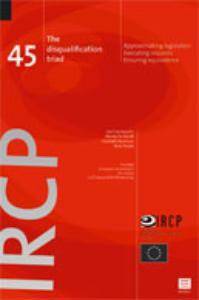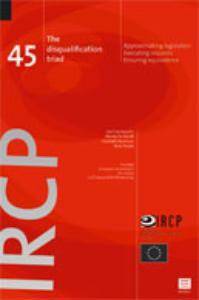
Je cadeautjes zeker op tijd in huis hebben voor de feestdagen? Kom langs in onze winkels en vind het perfecte geschenk!
- Afhalen na 1 uur in een winkel met voorraad
- Gratis thuislevering in België vanaf € 30
- Ruim aanbod met 7 miljoen producten
Je cadeautjes zeker op tijd in huis hebben voor de feestdagen? Kom langs in onze winkels en vind het perfecte geschenk!
- Afhalen na 1 uur in een winkel met voorraad
- Gratis thuislevering in België vanaf € 30
- Ruim aanbod met 7 miljoen producten
Zoeken
The Disqualification Triad, 45
Approximating Legislation. Executing Requests. Ensuring Equivalence
G Vermeulen, W de Bondt, C Ryckman, N Persak
€ 125,95
+ 251 punten
Omschrijving
In the past decades, the European Union has made little progress with respect to disqualifications as a sanction mechanism for the violation of laws. The creation of some form of harmonization is necessary, but the complex nature of this specific sanction mechanism has caused policy initiatives to be postponed, time after time. In answer to a call from the European Commission, the contributors in this book have conducted a comparative legal analysis in the EU 27 and looked into the practical experiences with disqualifications from a domestic and a cross border perspective. To that end, academics, policy makers, and practitioners in the Member States have been consulted. Analysis reveals a wide variety in the typology of the disqualifications as a sanction measure, the typology of the persons to whom the disqualifications can be imposed, and the typology of the authorities involved. Furthermore, there are considerable differences with respect to the inclusion of disqualifications in the national criminal records databases. Linked thereto information on foreign disqualifications is scarce and rarely used in practice. To ensure a comprehensive and consistent policy approach, this book has come up with a so called disqualification triad, comprising: (1) unified EU-wide disqualifications, (2) mutual recognition of disqualifications, and (3) EU-wide equivalent effect of disqualifications. The functioning of the disqualification triad has been further elaborated on in three case studies, which are public procurement disqualifications, disqualifications from working with children, and driving disqualifications. In doing so, this book is essential reading for both EU and national policy makers, as well as for researchers and practitioners involved. (Series: Institute for International Research on Criminal Policy [IRCP] - No. 45)
Specificaties
Betrokkenen
- Auteur(s):
- Uitgeverij:
Inhoud
- Aantal bladzijden:
- 342
- Taal:
- Engels
- Reeks:
- Reeksnummer:
- nr. 45
Eigenschappen
- Productcode (EAN):
- 9789046605219
- Verschijningsdatum:
- 30/06/2012
- Uitvoering:
- Paperback
- Formaat:
- Trade paperback (VS)
- Afmetingen:
- 160 mm x 239 mm
- Gewicht:
- 635 g

Alleen bij Standaard Boekhandel
+ 251 punten op je klantenkaart van Standaard Boekhandel
Beoordelingen
We publiceren alleen reviews die voldoen aan de voorwaarden voor reviews. Bekijk onze voorwaarden voor reviews.









